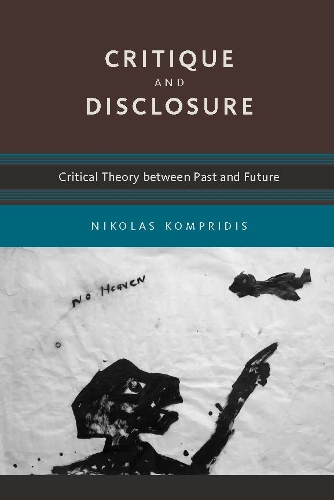
Critique and Disclosure: Critical Theory between Past and Future
(Paperback)
Publishing Details
Critique and Disclosure: Critical Theory between Past and Future
By (Author) Nikolas Kompridis
MIT Press Ltd
MIT Press
19th August 2011
United States
Classifications
Professional and Scholarly
Non Fiction
142
Physical Properties
Paperback
354
Width 152mm, Height 229mm, Spine 17mm
476g
Description
A provocatively argued call for shifting the emphasis of critical theory from Habermasian "critique," restricted to normative clarification, to "disclosure," a possibility-enhancing approach that draws on and reinterprets ideas of Heidegger.In Critique and Disclosure, Nikolas Kompridis argues provocatively for a richer and more time-responsive critical theory. He calls for a shift in the normative and critical emphasis of critical theory from the narrow concern with rules and procedures of J rgen Habermas's model to a change-enabling disclosure of possibility and the enlargement of meaning. Kompridis contrasts two visions of critical theory's role and purpose in the world- one that restricts itself to the normative clarification of the procedures by which moral and political questions should be settled and an alternative rendering that conceives of itself as a possibility-disclosing practice. At the center of this resituation of critical theory is a normatively reformulated interpretation of Martin Heidegger's idea of "disclosure" or "world disclosure." In this regard Kompridis reconnects critical theory to its normative and conceptual sources in the German philosophical tradition and sets it within a romantic tradition of philosophical critique. Drawing not only on his sustained critical engagement with the thought of Habermas and Heidegger but also on the work of other philosophers including Wittgenstein, Cavell, Gadamer, and Benjamin, Kompridis argues that critical theory must, in light of modernity's time-consciousness, understand itself as fully situated in its time-in an ever-shifting and open-ended horizon of possibilities, to which it must respond by disclosing alternative ways of thinking and acting. His innovative and original argument will serve to move the debate over the future of critical studies forward-beyond simple antinomies to a consideration of, as he puts it, "what critical theory should be if it is to have a future worthy of its past."
Reviews
This is an important and timely (or time-sensitive) book, both in philosophical and in practical-political terms.
-- Fred Dallmayr * Notre Dame Philosophical Review *This is a book that needed to be written. Habermas's critique of disclosure was at times narrow and shortsighted. But as Habermas is now rethinking some of these shortcomings, Kompridis gives himand indeed all critical theoristsample resources for a stronger integration of disclosive with formal and procedurally guided forms of thought.
-- James Swindal * International Journal of Philosophical Studies *With Critique and Disclosure, Nikolas Kompridis makes an impressive intervention in the self-definition of Critical Theory [this book] will become a necessary reading for all those invested in the reinvigoration or, possibly, transformation of this tradition.
-- Patrick Gamez * Symposium: Canadian Journal of Continental Philosophy *Author Bio
Nikolas Kompridis is Professorial Fellow at the Centre for Citizenship and Public Policy at University of Western Sydney. He is editor of the book Philosophical Romanticism.
